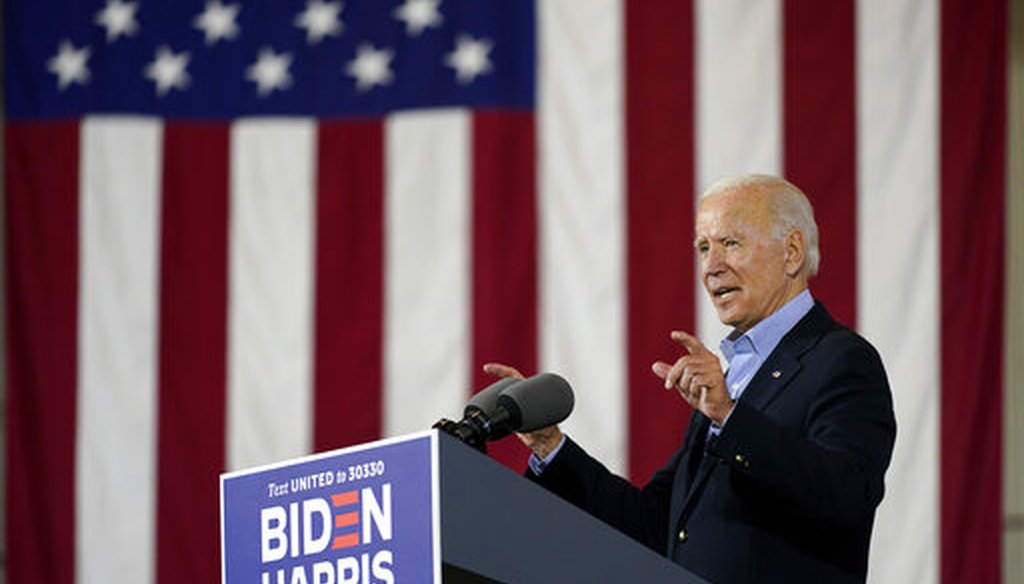Stand up for the facts!
Our only agenda is to publish the truth so you can be an informed participant in democracy.
We need your help.
I would like to contribute

Democratic presidential candidate former Vice President Joe Biden speaks after touring International Union of Operating Engineers Local 66, Wednesday, Sept. 30, 2020, in New Alexandria, Pa. (AP)
If Your Time is short
-
Biden has made some verbal blunders during his current campaign, including about COVID-19 death numbers and race.
-
Some posts on social media, however, have deceptively edited Biden’s remarks to manufacture errors. They are amplified by Trump and his supporters.
Before news of President Donald Trump’s positive COVID-19 test upended the election cycle with a host of unknowns, one of his campaign’s leading narratives was that of Joe Biden as a clumsy, aging orator who frequently flubs the facts.
The evidence driving this line of attack on the former vice president and Democratic presidential nominee has been a mixture of truths and exaggerations, doctored video and recorded moments lacking context.
During an interview with Telemundo that provided such fodder, Biden responded to a listener who asked him about the Obama-Biden record on deportations.
Biden promised to freeze deportations for the first 100 days and only deport people who committed a felony while in the U.S.
Biden, 77, can then be heard saying, "OK. I lost that..."
Sign up for PolitiFact texts
Conservatives on social media pounced. They had the situation all figured out.
"Joe Biden caught red handed using a teleprompter," declared a video meme tweeted by Eric Trump, that quoted Biden as saying "I lost that line."
That isn’t what happened, or what Biden said. Telemundo doesn’t allow someone being interviewed to use a teleprompter.
What Biden actually said was, "I lost that lady," when the monitor on which the woman was seen asking her question went blank.
During his decades-long career, Biden, who stuttered as a child, has made some notable verbal blunders. During this campaign, he has flubbed numbers, told tales and mixed up events and locations. He has admitted he sometimes uses awkward phrases and, in his 2017 book "Promise Me, Dad," called himself a "gaffe machine." During the first presidential debate, in fact, some viewers and pundits noted his performance for its lack of verbal missteps.
Trump, 74, and conservative media have been quick to mock Biden’s words when he stumbles. Their strategy has been to portray Biden as an old man unfit to lead. But sometimes they stretch the attack into a narrative that never happened. One deceptively edited video shared on a Trump aide’s personal account showed Biden falling asleep during a TV interview — but the anchor was interviewing someone else entirely.
Biden’s supporters punch back with examples of Trump’s own speech, ranging from the head-scratching "covfefe" tweet to inflammatory language about race and falsehoods about Biden policies, voting and COVID-19.
With all the attention Biden’s detractors give to his errors in speech — some fabricated, some real — the key question is whether these moments are persuasive enough to influence how folks will vote. And, in light of Trump’s illness and the associated questions about his administration’s communication about the president’s health, will this line of attack sway portions of the electorate?
Many of Biden’s blunders have been about numbers. He stated that there were millions of gun deaths when he should have said thousands. He has botched COVID-19 numbers, for example, saying there were 6,114 "military COVID deaths" — when he meant to say Michigan deaths.
But sometimes the right has gone too far with its criticism of Biden’s stumbles.
In June, Trump tweeted a five-second clip of Biden stating: "Now we have over 120 million dead from COVID."
Trump tweeted the clip and wrote: "If I ever said something so mortifyingly stupid, the Fake News Media would come down on me with a vengeance. This is beyond a normal mistake. Why isn’t the media reporting it?"
Mediaite captured the full sentence by Biden, which showed that after citing the wrong number, he quickly corrected himself: "Now we have over 120 million dead from COVID, I mean, 120,000 dead from COVID." Biden made a similar flub later, saying there were about 200 million covid deaths when he should have said 200,000.
As Biden sought the support of Black voters who helped him win the primary, he emphasized his work alongside former President Barack Obama and his support for civil rights legislation. But Biden has also made some comments about race that were either inaccurate or simply awkward.
During an interview with Charlamagne tha God, the host of The Breakfast Club, which is popular with Black listeners, Biden said: "If you have a problem figuring out whether you’re for me or Trump, then you ain’t Black." Biden pivoted to make a false statement that the NAACP had endorsed him in every campaign. Later in the day, he walked back the "you ain’t Black" comment.
Biden said during a primary debate that he had been endorsed by the "only African American woman that’s ever been elected to the United States Senate."
"No, that's not true," responded Sen. Kamala Harris, then one of his rivals for the Democratic nomination. "The other one is here."
Biden’s team said he meant to say the "first" African American female senator endorsed him, Carol Moseley Braun.
Biden told Black and Hispanic journalists that "unlike the African American community, with notable exceptions, the Latino community is an incredibly diverse community with incredibly different attitudes about different things." Biden later tweeted that he didn’t mean to suggest that the African American community is monolithic.
The impact of Biden’s word blunders have to be evaluated in the context of Trump’s record, said Howard University political scientist Michael K. Fauntroy.
"We are having a serious conversation about whether the president of the United States is racist," he said. "For Black voters, that is much more profound than the things Biden said."
RELATED: The long history of racism in the US presidency
Some of Biden’s past words about race have been deceptively edited to make them appear racist. An anti-Biden Twitter account posted an out-of-context 17-second clip in which Biden says, "The culture, our culture, our culture is not imported from some African nation or some Asian nation, it is our English jurisprudential culture — our European culture."
Omitted was the fact that Biden was answering a woman’s question about what he’s done to address domestic assault and sexual violence. In that 13-minute response, Biden said, "this is about changing the culture, our culture."
Biden was saying that violence against women is rooted in European culture, and the United States must change the culture of violence against women.
On the campaign trail, Biden sometimes struggles to get out a standard line. The Trump campaign then highlights his stumble.
Dan Scavino, an assistant to Trump, tweeted a short clip of Biden stating in Missouri in March, "We cannot get re-elect, we cannot win this re-election. Excuse me. We can only re-elect Donald Trump."
"I agree with Joe!" Trump tweeted.
Biden mangled his delivery, but the Republican video stops before Biden reached his main point, calling for Democrats to unite rather than attack each other.
"We can only re-elect Donald Trump if in fact we get engaged in this circular firing squad here. It's got to be a positive campaign. So join us. Folks, we are building a coalition," Biden said.
Some of Biden’s flubs seem inconsequential, but in front of the right crowd Trump delivers them as laugh lines.
At a May 14 event at a business in Pennsylvania, Trump poked fun of Biden saying "N1H1" in the past to refer to the 2009 swine flu instead of H1N1.
Biden did reverse the phrase at a March debate. That said, Trump in Pennsylvania (and many other times) referred to the 1918 flu as the 1917 flu.
Democrats say such minor flubs are nothing next to Trump‘s comments about COVID-19. Trump boasted about U.S. testing levels but falsely said there would be fewer cases if there were less testing.
RELATED: 10 of Trump’s biggest falsehoods about COVID-19
We shared some of Biden’s verbal blunders with Gerald A. Maguire, an expert on stuttering and chair of psychiatry and neuroscience at UC Riverside School of Medicine. We asked Maguire to explain which mistakes could be related to stuttering.
When Biden has said "millions" rather than "thousands," it’s possible that what he was doing was word substitution to avoid a problematic word.
"People who stutter, we subconsciously or even consciously substitute a word. If you think you are going to stutter on the ‘th’ sound — thousands — our brains are hardwired since age 3, 4 to think of something else," Maguire said.
Maguire gave an example from his own life in kindergarten when a teacher assigned him to give a speech about his family. Maguire struggled with the "br" sound, so used a thesaurus to look up the word "brother" and decided to substitute the word "sibling" instead.
Stuttering doesn’t necessarily explain everything. For example, when Biden told a tale about being arrested in South Africa — he wasn’t, so we rated that Pants on Fire — he was not stuttering.
Maguire said he can’t speak to Biden’s psyche. However, he said that when people who stutter then become fluent, it creates a feeling of freedom and a sense of "I will speak free. No one will shut me up."
Maguire pointed to a few examples of Biden stuttering during his first debate with Trump, including when he spoke about the Affordable Care Act and Medicaid.
"They can get that free in most states except governors who want to deny people who are poor Medicaid. Anyone who qualifies for Medicare would — excuse me, Medicaid would automatically be enrolled in the public option," Biden said.
Biden blinked his eyes when he said Medicare and then corrected himself. Motor movements such as eye blinks can accompany stuttering.
Biden told Axios in December that he feels the media is obsessed with noting his verbal missteps and said that he doesn’t consider himself to be stuttering while campaigning. "I don't think of myself as continuing to stutter," he said.
As Trump’s detractors say his regular fibbing makes him unpresidential, Biden’s opponents say the former vice president’s stammers and mistakes, clumsy moments and unexpected asides show he’s not up for the job.
Trump supporters have cast these sound bites as if they are indicative of Biden’s overall health, with social media memes and videos reiterating these messages by focusing on Biden’s age.
When we reached out to Neil Newhouse, a Republican pollster and partner of Public Opinion Strategies, before Trump fell ill. Newhouse said Biden’s verbal slip-ups make a difference if they are then connected to a greater concern voters have about Biden’s sharpness.
University of Virginia political scientist Larry Sabato said that line of attack seems to lack heft now that the American public is grappling with Trump’s real-life diagnosis. "Each candidate can play the ‘I’ll see you and raise you’ game but the attack line about Biden’s nonexistent dementia falls flat now," Sabato said. "It’s Trump who is ill, not Biden, and Biden’s gaffes tend to be harmless."
Our Sources
Rev.com, Joe Biden "You Ain’t Black" Interview Transcript on Radio Show with Charlamagne tha God, May 22, 2020
Washington Post, Biden walks back suggestion that black voters who aren’t already supporting him ‘ain’t black’ May 22, 2020
Politico, Biden: Latino community is diverse, ‘unlike the African American community’ Aug. 6, 2020
Joe Biden, Tweet, Aug. 6, 2020
President Donald Trump, Tweet, June 25, 2020
President Donald Trump, Tweet, March 2, 2020
New York Times, The Many Ways That Joe Biden Trips Over His Own Tongue, Oct. 30, 2019
Joe Biden’s book, Promise Me, Dad, 2017
Telemundo, Tweet, Sept. 23, 2020
AP, Biden’s ‘record player’ just 1 of his vintage references, Sept. 14, 2019
Washington Post, Allegations of racism have marked Trump’s presidency and become key issue as election nears, Sept. 23, 2020
USA Today, Joe Biden is a self-described 'gaffe machine.' So far, Democratic voters don't seem to mind. Sept. 6, 2019
Bloomberg, Biden Misdates 2018 Parkland Shooting in His Latest Blunder, Aug. 10, 2019
Snopes, Did Joe Biden Say the Mass Shootings in El Paso and Dayton Happened in ‘Houston’ and ‘Michigan’? Aug. 7, 2019
Washington Post, Transcript: The November Democratic debate, 2019
New York TImes, Those Biden ‘Gaffes’? Some Key Voters Actually Like Them, Sept. 16, 2020
Mediaite, Audio Reveals Hannity-Hyped Biden ‘Gaffe’ About 120 Million Covid Dead Was Corrected Immediately, June 26, 2020
Politico, Biden: Latino community is diverse, ‘unlike the African American community’ Aug. 6, 2020
Fivethirtyeight, There’s No Such Thing As The ‘Latino Vote’ Sept. 22, 2020
Breitbart News, Tweet, Sept. 2020
Factba.se, Remarks: Donald Trump Visits Owens & Minor Distribution Center in Allentown, PA, May 14, 2020
Stephen Frantzich op-ed in the Baltimore Sun, Joe Biden has a history of gaffes, but what do they mean? Sept. 10, 2020
San Francisco Gate, Top ten campaign gaffes in modern presidential history, Sept. 18, 2012
Los Angeles Times, Joe Biden’s childhood struggle with a stutter: How he overcame it and how it shaped him, Sept. 15, 2019
The Atlantic, What Joe Biden can’t bring himself to say, January 2020
Boston Herald, Biden weathers Trump firestorm, disavows Green New Deal in first debate, Sept. 29, 2020
Axios, Biden: Stuttering not to blame for verbal screwups, Dec. 8, 2019
Frontiers in Neuroscience, The Pharmacologic Treatment of Stuttering and Its Neuropharmacologic Basis, March 27, 2020
PolitiFact, Joe Biden’s Truth-O-Meter record and Donald Trump’s Truth-O-Meter record, Accessed Sept. 23, 2020
Telephone interview, Michael K. Fauntroy, Howard University political scientist Sept. 24, 2020
Telephone interview, Stephen Frantzich, a retired professor of political science at the U.S. Naval Academy, Sept. 24, 2020
Email interview, Stephanie Muravchik, Visiting Assistant Professor at Claremont McKenna College, Sept. 24, 2020
Email interview, Neil Newhouse, Public Opinion Strategies partner, Sept. 25, 2020
Email interview, Gerald A. Maguire, professor and chair of psychiatry and neuroscience at UC Riverside School of Medicine, Sept. 30, 2020
Email interview, Larry J. Sabato, founder and director of the University of Virginia Center for Politics, Oct. 5, 2020














































